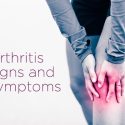Psoriasis: Signs and symptoms
Psoriasis is an autoimmune disease that affects the skin — sending signals that tell skin cells to grow quickly. Skin cells then build up causing raised patches or plaque to appear on the surface. The amount and severity of symptoms can vary depending on the type of psoriasis. These are the five types of psoriasis:
- Plaque psoriasis
- Guttate psoriasis
- Pustular psoriasis
- Inverse psoriasis
- Erythrodermic psoriasis (exfoliative psoriasis)
1. Plaque Psoriasis
The most common form is plaque psoriasis, making up about 80 percent of psoriasis cases. Symptoms can include:
- Red, raised skin (also known as plaque).
- Plaque covered in a silvery-white coating, known as scales.
- Itching, burning, stinging skin.
- Patches of dry skin.
- Dry and cracked skin that bleeds.
- Pain.
- Disorders of fingernails and toenails — pitting, discoloration, breaking.
2. Guttate psoriasis
Guttate psoriasis typically affects children and young adults, and usually clears up without treatment in a few weeks or months. Symptoms include:
- Small, red spots that develop on torso or limbs.
- Spots usually appear after respiratory illness, especially strep throat.
- Finer scales compared to other types.
3. Inverse psoriasis
Inverse psoriasis usually affects obese individuals or may be triggered by a fungal infection. Most people who have inverse psoriasis also suffer from another form of psoriasis on their body as well. Symptoms include:
- Found in the folds of skin — armpit, groin, buttocks.
- Bright red lesions.
- Smooth and shiny lesions.
- Soreness of skin where lesions developed.
4. Pustular psoriasis
Pustular psoriasis is a rare form that develops quickly. Symptoms include:
- White pustules/blisters surrounded by red and tender skin (not contagious).
- Soreness and pain near or on the blisters.
- Can develop anywhere on body but typically found on hands and feet.
- Fatigue.
- Fever.
- Chills.
- Itching.
- Diarrhea.
- Rapid pulse.
- Loss of appetite.
- Muscle weakness.
5. Erythrodermic psoriasis
Erythrodermic psoriasis (exfoliative psoriasis) is an uncommon form, only affecting three percent of people who have psoriasis. If you have an erythrodermic flare-up, seek medical attention immediately; it could be a life-threatening condition. This type of psoriasis affects and covers most of the body. Additional symptoms include:
- Widespread, fiery redness (appears sunburned) of skin covering most of the body.
- Shedding or peeling of skin in sheets.
- Severe itching and burning.
- Intense pain.
- Fluctuations in body temperature.
- Racing heart rate.
The exact cause of psoriasis is unknown but has been shown that the immune system and genetics play a major role. About a third of those who suffer also have a family member with the condition. While there is no cure for psoriasis, it can be managed by talking with your doctor about treatments to help slow down growth of cells and relieve additional symptoms.
Resoures:
http://www.healthline.com/health/psoriasis/facts-statistics-infographic#Types4
https://www.aad.org/public/diseases/scaly-skin/psoriasis#symptoms
http://www.webmd.com/skin-problems-and-treatments/psoriasis/understanding-psoriasis-basics#1


